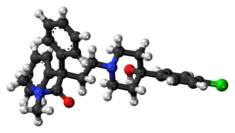Loperamide
 |
|
 |
|
| Clinical data | |
|---|---|
| Pronunciation | /loʊˈpɛrəmaɪd/ |
| Trade names | Imodium, others |
| AHFS/Drugs.com | Monograph |
| MedlinePlus | a682280 |
| Pregnancy category |
|
| Routes of administration |
by mouth |
| ATC code | |
| Legal status | |
| Legal status |
|
| Pharmacokinetic data | |
| Bioavailability | 0.3% |
| Protein binding | 97% |
| Metabolism | Liver (extensive) |
| Biological half-life | 9–14 hours |
| Excretion | Faeces (30–40%), urine (1%) |
| Identifiers | |
|
|
| Synonyms | R-18553 |
| CAS Number | |
| PubChem CID | |
| IUPHAR/BPS | |
| DrugBank | |
| ChemSpider | |
| UNII | |
| KEGG | |
| ChEBI | |
| ChEMBL | |
| ECHA InfoCard | 100.053.088 |
| Chemical and physical data | |
| Formula | C29H33ClN2O2 |
| Molar mass | 477.037 g/mol (513.506 with HCl) |
| 3D model (Jmol) | |
|
|
|
|
|
|
|
Loperamide, sold under the brand name Imodium among others, is a medication used to decrease the frequency of diarrhea. It is often used for this purpose in gastroenteritis, inflammatory bowel disease, and short bowel syndrome. It is not recommended for those with blood in the stool. The medication is taken by mouth.
Common side effects include abdominal pain, constipation, sleepiness, vomiting, and a dry mouth. It may increase the risk of toxic megacolon. Loperamide's safety in pregnancy is unclear, but there is no evidence of harm. It appears to be safe in breastfeeding. It is an opioid with no significant absorption from the gut and does not cross the blood brain barrier when used at normal doses. It works by slowing the contractions of the intestines.
Loperamide was first made in 1969 and used medically in 1976. It is on the World Health Organization's List of Essential Medicines, the most effective and safe medicines needed in a health system. Loperamide is available as an inexpensive generic medication. The wholesale cost in the developing world is about US$0.004 to US$0.04 per dose. In Aug 2016, the US retail cost is about US$0.31 per dose.
Loperamide is effective for the treatment of a number of types of diarrhea. This includes control of acute nonspecific diarrhea, mild traveler's diarrhea, irritable bowel syndrome, chronic diarrhea due to bowel resection, and chronic diarrhea secondary to inflammatory bowel disease. It is also useful for reducing ileostomy output. Off-label uses for loperamide also include chemotherapy induced diarrhea, especially related to irinotecan use.
...
Wikipedia
